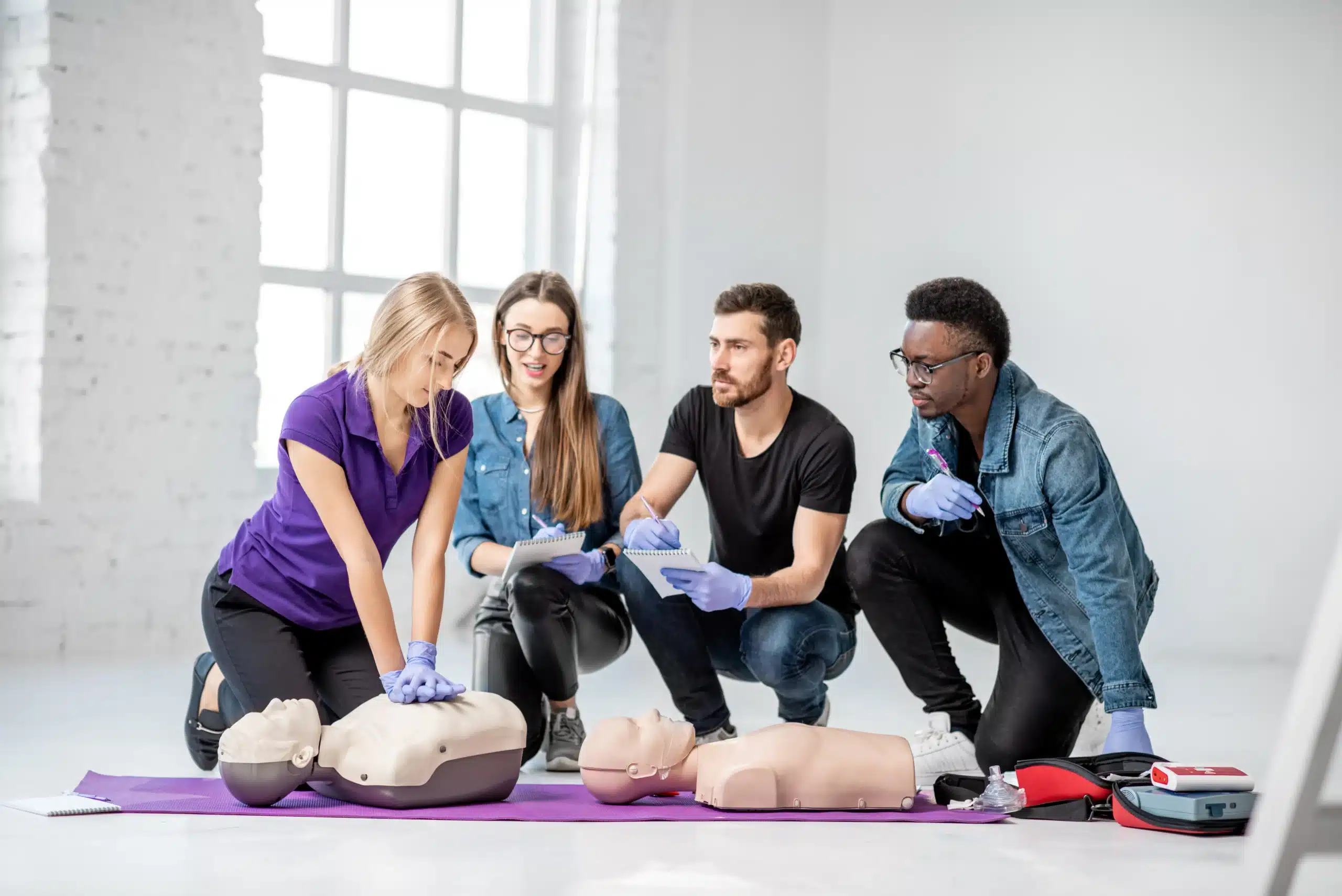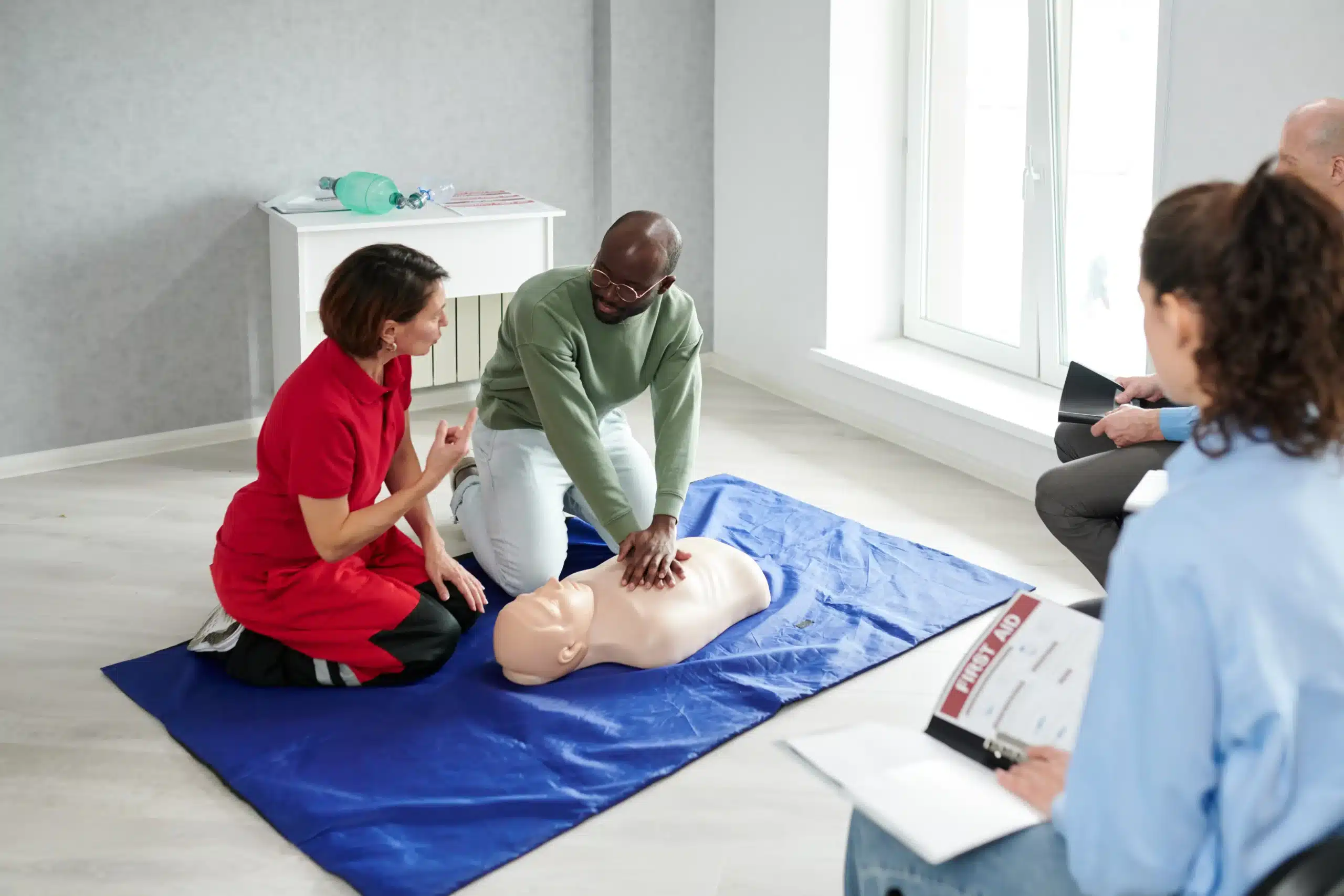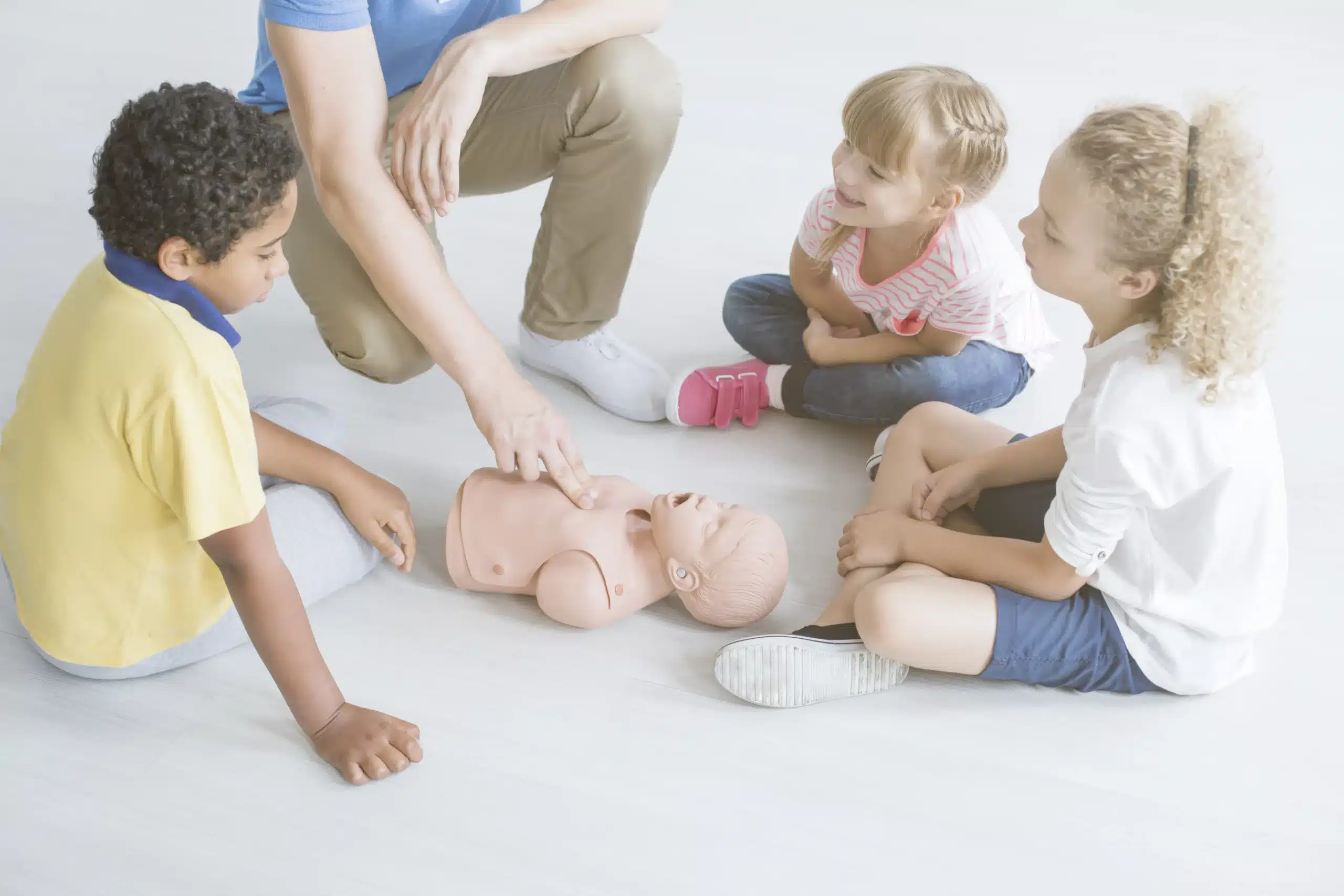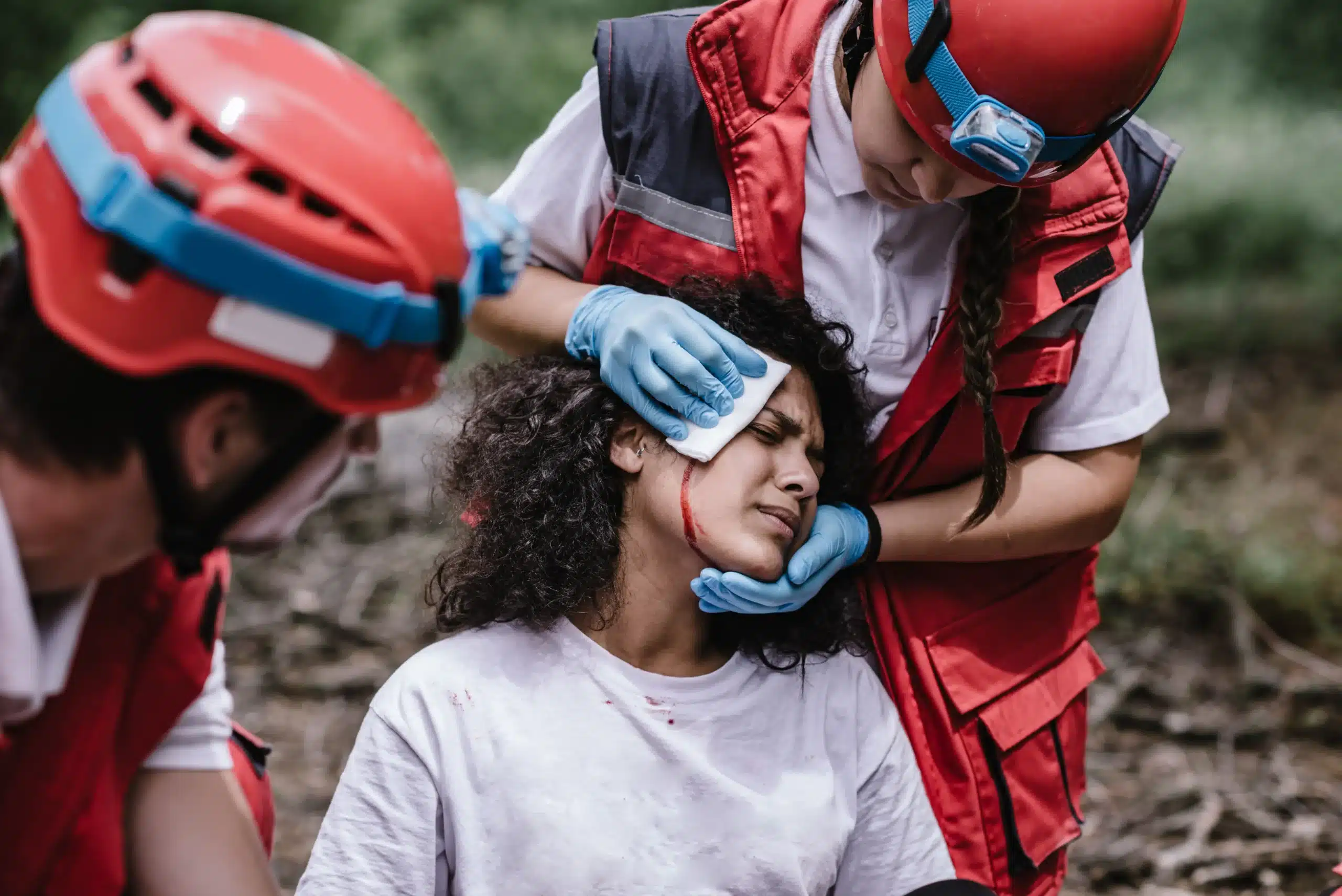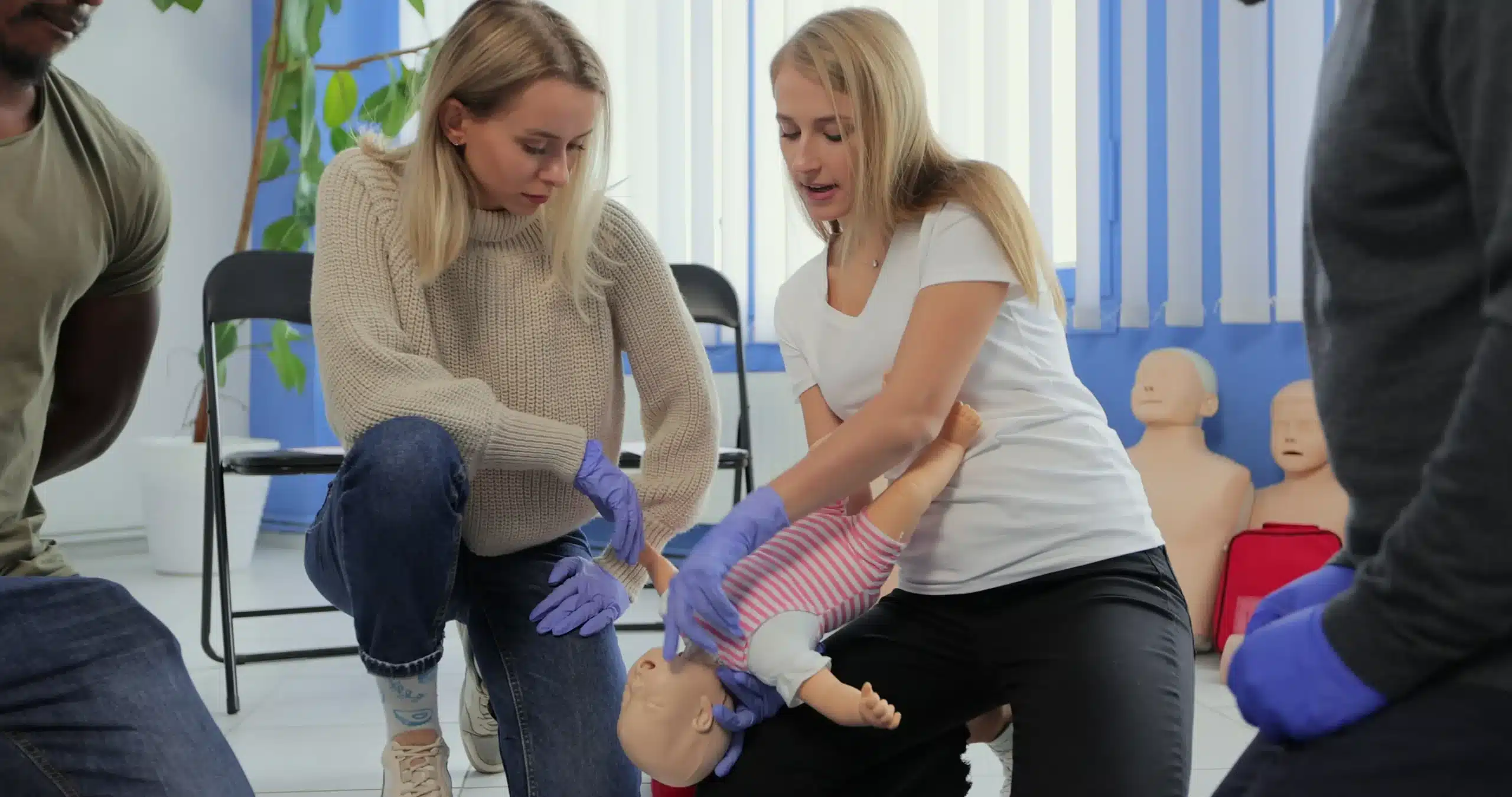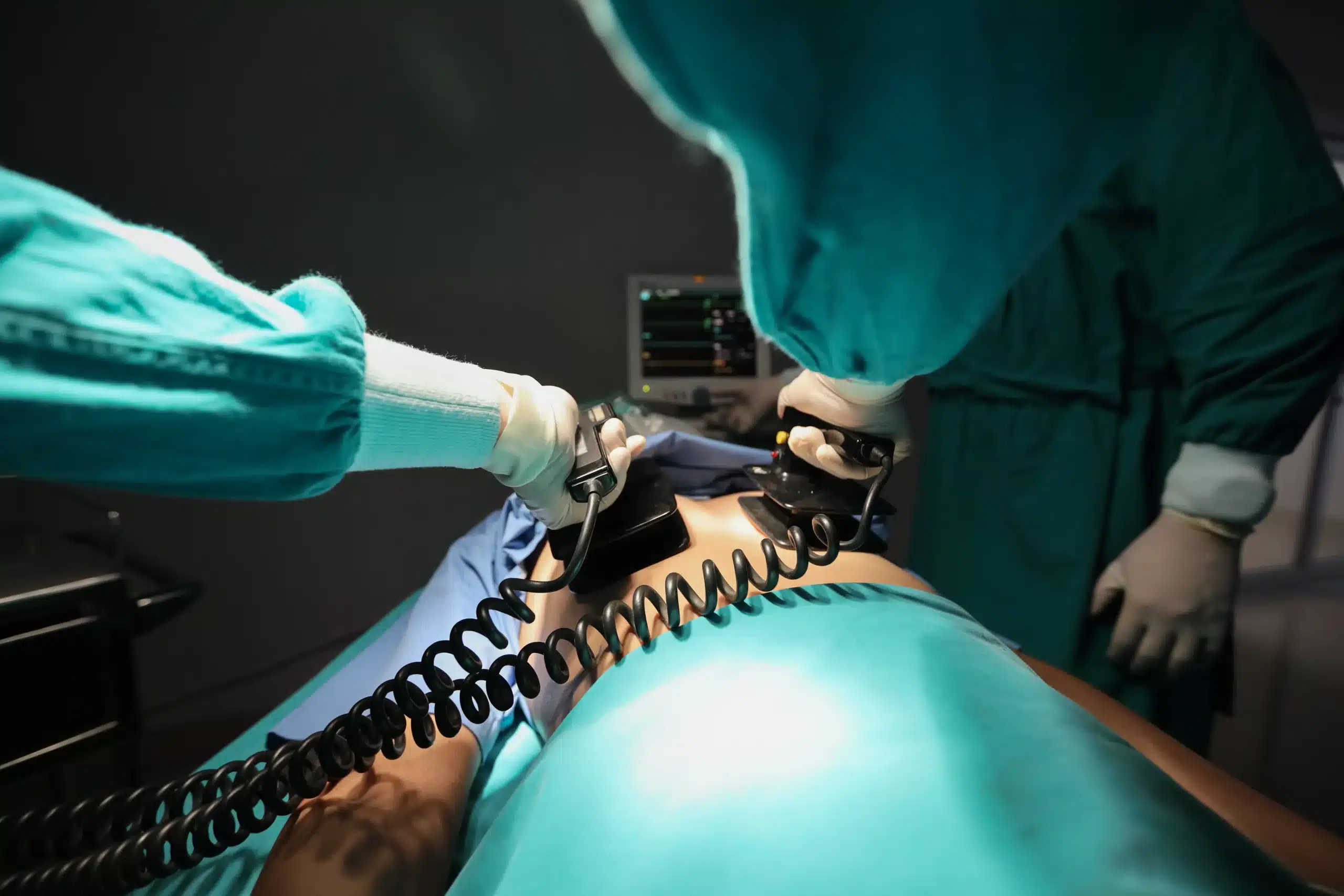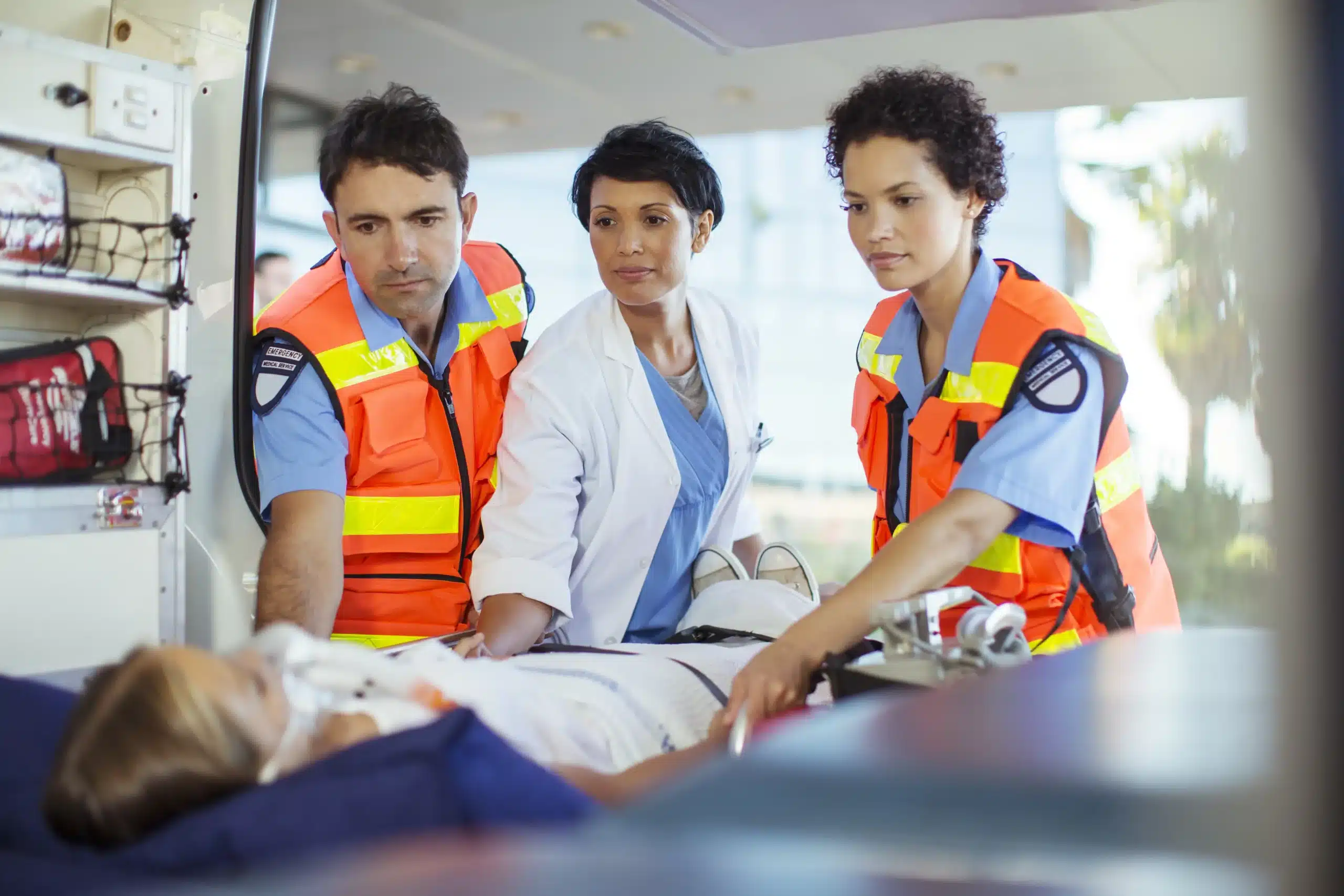Accidents happen, especially with children. Knowing how to respond in a medical emergency can be the difference between a minor scare and a serious situation. This guide simplifies the process of finding pediatric CPR and first-aid in Mountain House, offering a clear overview of available training options, local requirements, and essential skills. We’ll cover everything from the basics of CPR and first aid to choosing the right course and staying up-to-date with the latest guidelines. Whether you’re a parent, caregiver, or simply want to be prepared, this guide will equip you with the knowledge and confidence to handle any pediatric emergency.
Key Takeaways
- Pediatric CPR and first aid require specific techniques: These skills differ from adult CPR and address the unique needs of infants and children. Look for training that covers CPR for all ages, AED use, and essential first-aid skills.
- Find a course that fits your lifestyle: Explore various options, including in-person classes, online programs, and community-based training. Consider factors like cost, instructor experience, and schedule flexibility.
- Stay prepared with regular practice: Refresh your skills periodically and stay informed about updated guidelines to maintain your confidence and preparedness for emergencies. Explore local resources and refresher courses to support your ongoing learning.
What is Pediatric CPR and First-Aid?
Pediatric CPR and first-aid are essential skills for responding to emergencies involving infants and children. They differ from adult CPR and first-aid, as they address the unique physiological needs of younger patients. Pediatric CPR often involves shallower chest compressions and the use of a single hand for smaller children, unlike adult CPR, which uses two hands and deeper compressions. For a helpful comparison, see this article on CPR differences.
The American Heart Association offers the Heartsaver Pediatric First Aid CPR AED course, designed for people involved in childcare. This comprehensive course covers CPR for adults, children, and infants, using an Automated External Defibrillator (AED), rescue breathing, and relieving choking. The training also includes essential first-aid skills for various emergencies, from minor injuries to life-threatening situations. For those in the Mountain House area, more information on combined first-aid and CPR training is available here. This combined approach ensures caregivers are well-prepared for a wide range of situations.
Pediatric CPR and First-Aid Training in Mountain House
Knowing where to find quality CPR and first-aid training is essential for parents, caregivers, and anyone working with children. Here are some options for pediatric CPR and first-aid training in Mountain House:
Safety Training Seminars
Safety Training Seminars offers a variety of courses, including CPR, first aid, and other safety certifications. Check their website or contact them directly to find pediatric-specific courses and schedules. They often provide on-site training for groups, which can be convenient for businesses and organizations. For more information, visit the Safety Training Seminars website.
In-Home CPR
For busy families or those who prefer a more personalized learning experience, In-Home CPR brings the training to you. Their certified instructors travel throughout the Bay Area, offering flexible scheduling options, including evenings and weekends. They specialize in creating a comfortable learning environment, which can be especially helpful for those who may feel anxious about learning these critical skills. Learn more about their services and course availability.
French Camp McKinley Fire District
The French Camp McKinley Fire District frequently holds free CPR courses for the community, covering adult, child, and infant CPR. These courses are a valuable resource for residents looking for accessible training. Check the Fire District’s website for upcoming course dates and registration information.
Mountain House Fire Department
In partnership with the French Camp McKinley Fire District, the Mountain House Fire Department also provides CPR training. As authorized training centers for the American Heart Association, they offer certified courses that meet industry standards. Contact the Mountain House Fire Department or visit the French Camp McKinley Fire District website for more information on their collaborative CPR training programs.
American Red Cross Online Courses
If you need a flexible learning option, the American Red Cross offers online pediatric CPR, AED, and first-aid certification. These courses allow you to learn at your own pace and cover essential skills for responding to emergencies involving infants, children, and adults. This can be a great option for those with busy schedules or who prefer self-paced learning.
Key Features and Benefits
Knowing what to expect from your pediatric CPR and first-aid training can help you choose the best class for your needs. Here’s what sets quality training apart:
Comprehensive Curriculum
A solid pediatric CPR and first-aid program covers a wide range of essential skills. You’ll learn CPR for adults, children, and infants, how to use an AED, rescue breathing techniques, and what to do if someone is choking. Thorough training ensures you can confidently respond to various emergencies. This often includes team CPR dynamics and recognizing the signs of a medical emergency. Safety Training Seminars, for example, offers a comprehensive curriculum aligned with American Heart Association guidelines.
Flexible Scheduling
Juggling work, family, and other commitments? Look for a program with flexible scheduling. Classes offered seven days a week, including evenings, make it easier to find a time that works for you. Providers like In-Home CPR understand busy schedules and offer convenient options, sometimes even with no minimum class size for a more personalized experience.
Qualified Instructors
Experienced instructors are key to effective training. Confirm your course is led by qualified professionals, such as EMTs, RNs, or paramedics. Their expertise ensures you receive high-quality instruction and develop practical skills necessary for emergency situations. In-Home CPR emphasizes the value of learning from seasoned professionals.
On-Site Training
On-site training offers unparalleled convenience. Instructors come to your location—whether it’s your home, office, or a childcare facility—allowing you to learn in a comfortable environment. This personalized approach can enhance the learning experience. Providers like In-Home CPR bring the training to you, simplifying logistics.
EMSA Compliance for Childcare Providers
If you’re a childcare provider in California, ensure your training meets all California EMSA requirements. This is crucial for complying with state regulations. Look for courses that align with these requirements and provide the necessary certification, like those offered by Safety Training Seminars. This ensures you’re providing a safe and regulated environment. The American Red Cross also offers certified pediatric first aid, CPR, and AED courses that often meet these standards.
Complying with Local Regulations and Standards
Knowing the rules and guidelines around pediatric CPR and first-aid training can feel overwhelming. This section breaks down key requirements and recommendations to help you make informed decisions about your training.
California EMSA Requirements
If you’re a childcare provider in California, you’ll need to be familiar with the Emergency Medical Services Authority (EMSA) requirements. EMSA sets specific standards for pediatric CPR and first-aid training to ensure caregivers can respond effectively to emergencies. These regulations mandate that licensed childcare providers complete training covering illness and injury prevention, including CPR techniques for infants and children. For more information on EMSA-approved training, visit our EMSA Child Care Health & Safety page. Staying compliant with these regulations is essential for maintaining your license and ensuring the children in your care remain safe.
American Heart Association Guidelines
The American Heart Association (AHA) offers widely recognized guidelines for CPR and first-aid, reflecting the latest research and best practices. Their Heartsaver Pediatric First Aid CPR AED course is a great option for those outside the healthcare field, covering essential skills for responding to emergencies involving infants and children. We offer several AHA-aligned CPR and first-aid certification courses to meet your specific needs. Staying current with the AHA’s regularly updated recommendations is key to providing effective care.
American Red Cross Certification
The American Red Cross also provides valuable certification courses in CPR, AED, and First Aid. These courses are beneficial for anyone working with children and cover adult, child, and infant CPR techniques. The Red Cross offers a range of programs tailored to different audiences, including childcare providers. Earning Red Cross certification helps you meet regulatory requirements and equips you with the confidence to handle emergencies.
Costs and Value
Knowing the costs associated with Pediatric CPR and First Aid training helps you budget effectively and choose the best option. Several factors influence training expenses, including individual versus group rates, free community courses, and certification renewal fees.
Individual vs. Group Pricing
Individual Pediatric CPR and First Aid training typically costs somewhere between $25 and $60 per person. Pediatric CPR instruction on its own usually ranges from $25 to $40, while combined CPR and First Aid training averages $40 to $60 per person. Group training, however, offers substantial savings for organizations like schools and childcare centers. For groups of eight or fewer, Safety Training Seminars offers a competitive flat rate, making it more cost-effective to train your staff. See our group discounts for more details.
Free Community Courses
Free CPR courses are a valuable resource for families and caregivers in Mountain House. Both the French Camp McKinley Fire District and the Mountain House Fire Department offer free American Heart Association Basic Life Support (CPR) training. These courses provide essential, life-saving skills without any cost. Contact your local fire department or explore our CPR course options to find upcoming classes.
Certification Renewal Fees
CPR certifications are generally valid for two years. Renewal costs vary, usually falling between $15 and $55 for basic CPR and AED training and certification. Remember to include these renewal fees when planning your training budget. Safety Training Seminars provides two-year certifications, giving you plenty of time before needing a refresher. We also offer a low price guarantee, ensuring you always receive competitive pricing.
Registering for a Course
Getting signed up for a Pediatric CPR and First-Aid class is easier than you think. With several options available, you can find a course that fits your schedule and learning style.
Online Registration
Many organizations offer convenient online registration for CPR and first-aid certification courses. This allows you to quickly secure your spot and often includes flexible payment methods like credit card or company invoicing.
In-Person Sign-Up
If you prefer a personal touch, some providers offer in-person registration. For example, In-Home CPR offers classes in Mountain House, CA, and their instructors can come to your home or workplace.
Flexible Class Times and Locations
Finding a class time that works for you is key. Many training centers offer classes seven days a week, including evenings. There’s often no minimum number of students required. For larger groups, providers like CPR Select offer group training, a cost-effective way to train your team.
Choosing the Right Course
Finding the right pediatric CPR and first-aid course takes a little planning. It’s not a one-size-fits-all situation, so consider these points to make the best choice.
Assess Your Needs
First, ask yourself why you’re taking the course. Are you a parent wanting to be prepared for emergencies at home? A teacher responsible for a classroom of students? Or a childcare provider needing certification for your work? The American Heart Association offers the Heartsaver® Pediatric First Aid CPR AED course designed for anyone involved in childcare who needs to respond to emergencies. Understanding your motivation helps you choose the right training level. We also offer the EMSA Child Care Health & Safety training to meet California’s requirements for childcare providers.
Compare Course Offerings
Once you know what kind of training you need, compare different courses. Cost is always a factor, and CPR training prices vary depending on the course type and provider, as explained by CPR1. My CPR Certification Online notes that Pediatric CPR training typically costs somewhere between $25 and $40. Also, think about the course schedule. Look for classes offered on weekends, evenings, or in intensive formats to fit your schedule. Our discount group classes are a great option for saving money and learning with friends or colleagues. We also have a low price guarantee to ensure you’re getting the best value.
Certification Requirements for Different Professions
If you need certification for your profession, confirm the course meets all requirements. For instance, childcare providers in California must comply with EMSA guidelines. Our 8-hour EMSA-approved course covers everything required. The American Red Cross also offers a range of CPR, AED, and First Aid certifications accepted by many organizations. Check with your employer or licensing board to confirm you’re choosing the right certification. We offer a variety of courses, including American Heart Association certifications, to meet various professional needs. You can also consider our RQI program for a fast and convenient certification option.
Prepare for Your Training
Getting ready for your pediatric CPR and first-aid training? Knowing what to expect will help you feel confident and ready to learn these lifesaving skills.
What to Expect
Our pediatric first-aid and CPR courses empower anyone working with children—babysitters, nannies, teachers, camp counselors, and parents. The Heartsaver Pediatric First Aid CPR AED course covers the essential skills and knowledge you need to respond effectively to pediatric emergencies. We design our classes to be engaging and interactive, and we encourage questions. Your instructors are there to support you. Expect a mix of instruction, discussion, and hands-on practice.
Provided Materials and Equipment
We provide all the materials and equipment for your training, including mannequins for practicing CPR on infants, children, and adults. You’ll also work with AEDs (Automated External Defibrillators). Our classroom-based courses include demonstrations of rescue breathing, team CPR, and how to help someone who is choking. The combination of video instruction and hands-on practice, similar to what’s described by resources like eHealth CPR and the French Camp McKinley Fire District, helps you gain both the knowledge and the practical skills to respond confidently in an emergency. Just bring yourself, a willingness to learn, and comfortable clothes suitable for hands-on practice.
Maintain Your Skills
Earning your CPR and first-aid certification is a great accomplishment, but regular practice is essential to stay prepared for real-life emergencies. Here are a few ways to keep your skills sharp and your knowledge up-to-date:
Refresher Courses
Even if your certification hasn’t expired, refresher courses are a smart way to reinforce essential skills and learn about any updated guidelines. The French Camp McKinley Fire District and Mountain House Fire Department offer free American Heart Association Basic Life Support (CPR) courses to the community. These courses cover CPR for adults, children, and infants, along with AED use, rescue breathing, and how to help someone who is choking.
Practice at Home
Regular practice at home builds muscle memory and confidence. Walk through different emergency scenarios with family members and practice chest compressions and rescue breaths on mannequins if you have them. In-Home CPR offers classes like CPR Essentials, which focuses on techniques specifically for infants and toddlers. These instructors often create engaging learning environments and encourage questions, which helps students retain information more effectively.
Stay Updated with Guidelines
Emergency care guidelines change periodically to reflect the latest medical research. Staying informed about these updates ensures you’re always providing the most effective care. The American Heart Association Heartsaver Pediatric First Aid CPR AED Course is a good example of a program that aligns with the latest AHA Guidelines Update for CPR and Emergency Cardiovascular Care. Staying current is especially important for childcare providers and anyone who regularly works with children.
Community Resources and Support
Knowing where to find ongoing support and resources is important, especially after completing your pediatric CPR and first-aid training. Luckily, several options are available in Mountain House and the surrounding areas.
Local Support Groups
Connecting with others interested in pediatric first aid and CPR can create a sense of community and offer opportunities for ongoing learning. The French Camp McKinley Fire District and Mountain House Fire Department are authorized American Heart Association training sites and valuable community resources. They regularly conduct CPR training, ensuring families can access these life-saving skills. Check their websites or contact them directly to learn about potential support groups or community training events.
Free Training Opportunities
Both the French Camp McKinley Fire District and Mountain House Fire Department sometimes offer free American Heart Association Basic Life Support (CPR) courses. These initiatives empower individuals with the knowledge and skills to respond effectively in emergencies. Keep an eye on their websites and local community announcements for these opportunities. In addition, In-Home CPR offers pediatric first aid and CPR/AED certification classes throughout the San Francisco Bay Area and Sacramento, bringing the training directly to your location.
Continued Education Resources
Staying current with the latest guidelines and techniques is crucial for effective pediatric CPR and first aid. The American Heart Association offers the Heartsaver Pediatric First Aid CPR AED Course, designed for anyone involved in childcare. This course is an excellent resource for parents and caregivers. For childcare professionals, Adams Safety provides EMSA Licensed Childcare Pediatric CPR & First Aid training, which meets state requirements and covers essential skills for preventing illness and injury in children. Regularly reviewing resources like these will ensure you’re prepared to handle emergencies effectively.
Related Articles
- CPR Certification in Dublin: Your Guide – Livermore CPR Classes
- Find CPR Classes in Dublin: Your Complete Guide – Livermore CPR Classes
- Why CPR is Essential in Healthcare (and How to Get Certified)
- First-Aid in Mountain House: Essential Tips & Resources – Livermore CPR Classes
- EMSA Child Care Health & Safety – Livermore CPR Classes
Frequently Asked Questions
How does pediatric CPR differ from adult CPR? Pediatric CPR techniques are modified to accommodate the smaller size and different physiology of infants and children. This includes adjustments to the depth of chest compressions and hand placement. It’s crucial to learn these specific techniques to provide effective care in a pediatric emergency.
What kind of pediatric CPR and first-aid training is available in Mountain House? Several organizations offer pediatric CPR and first-aid training in Mountain House, including Safety Training Seminars, In-Home CPR, and local fire departments. These courses cater to different learning styles and schedules, with options for in-person, on-site, and online training.
What should I look for in a quality pediatric CPR and first-aid course? A quality course should have a comprehensive curriculum aligned with current guidelines, experienced instructors, and flexible scheduling options. For childcare providers in California, ensuring the course meets EMSA requirements is essential. Look for courses that offer hands-on practice and cover a range of emergency scenarios.
How much does pediatric CPR and first-aid training cost? The cost varies depending on the provider and the type of course. Individual courses typically range from $25 to $60, while group discounts are often available. Free community courses are also offered periodically by local fire departments. Remember to factor in certification renewal fees when budgeting for your training.
How can I stay up-to-date on pediatric CPR and first-aid guidelines after completing a course? Regularly practicing your skills, taking refresher courses, and staying informed about updates to guidelines are key to maintaining your preparedness. Connecting with local support groups and utilizing online resources can also provide ongoing support and continued learning opportunities.
